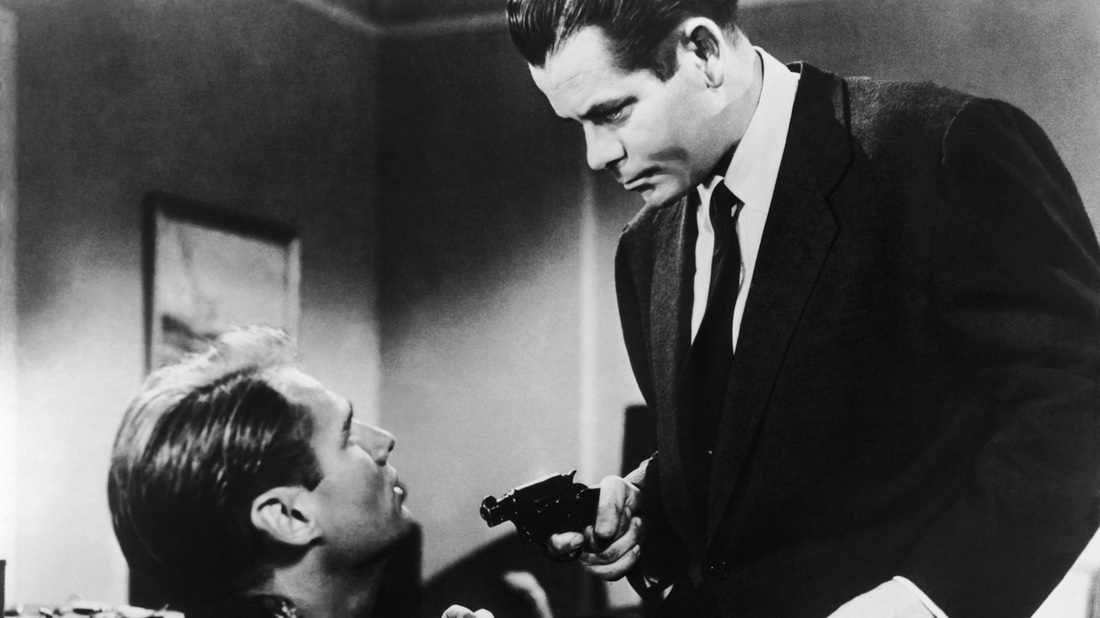|
No rating! Have you seen a film noir detective story? Those are your expectations. View accordingly.
DIRECTOR: Fritz Lang I'm an idiot. Teaching film, I feel like I should be on top of everything. I have the same complex when it comes to teaching English. I should read everything. I know it is impossible. There are just not enough hours in the day. When our film textbook decided to analyze a scene from The Big Heat, I threw it on the Netflix queue so I could be prepared for my class. I watched it. Enjoyed it. Came back to talk about it. The problem lies with the fact that I had already seen this movie and didn't realize it until I went through my film checklist. Yup. I had forgotten. I 60% blame myself. I 30% blame film noir titles for being super generic. I 10% blame the movie itself. After teaching M, I tried beefing up on my Fritz Lang again. I know that I've seen most of his oeuvre, but this one escaped me. The reason why is that it feels remarkably American. We studied German Expressionism and film noir was the natural evolution to Expressionism. The use of light and shadow to make the image come to life is center at both Expressionism and film noir. But the tone didn't feel anything like Lang's other work. Looking at both Metropolis and M, there is a certain surreal quality to both works that is missing here. In fact, this movie is as straightforward as it gets. The shadows are used exclusively to influence the mood, but doesn't affect Lang's attitude much. This is a world of shadow because that is what the genre is built around. In many ways, this film is the progenitor to the revenge flick. It plays tones of Lethal Weapon and The Punisher, but with the cop core at the center. Lang's greatest success is not in his intricate murder mystery, but with the emotional core that he places in Glenn Ford's Bannion. I'm slightly ashamed that I agree Lang's choices to fridge Bannion's wife. Perhaps it is acceptable here to create a woman character simply to motivate the male protagonist because it hasn't become completely cliche yet. But Lang presents Jocelyn Brando as the perfect wife in the perfect marriage for the sheer sake of tearing the world down. I am treading on dangerous ground talking about fridging a character. I weirdly come down on both sides of the argument about the purpose of fridging. When looking at gender studies, there is a valid perspective on the role of women in film. The only time women characters are given any depth in this era is to create a sense of relatablilty for the male protagonist. Otherwise, many of the women are presented as stereotypes. But I also understand that this is another time. Family is an important motivator and Bannion's reactions are validated through the loss of a truly loved character. The only weak choice on this whole front is the fairly removed reaction of the child. Bannion has one powerful line about lying to his daughter about the whereabouts of her mother, but that's the entirety of the emotional fallout from a dark moment that could have been explored deeper. While I care little about the actual mystery involved, although the presentation is fantastic, the real strength of this movie can be found in Lee Marvin and Gloria Grahame. Lee Marvin always impresses, but Gloria Grahame stands out at riding the line between caricature and deep. I spent much of the movie wondering where I had seen her before. (Unfortunately, it is only moments ago that I realized it was from this very movie.) She is mesmerizing while chewing up the scenery. Her motivations are confusing but explainable. Placing her in the proximity of Glenn Ford creates an interesting examination between the extroverted and the afraid. There's a lot going on with her performance. Perhaps her acting choices draw attention, but her presence in many ways makes this movie more relevant than those other film noirs. There is also the problem with the fact that I forgot that I had seen this movie, even after watching the whole movie. That bothers me. Yes, film noir titles are wildly generic, but this is a movie that has truly amazing moments. I want to discuss the final sequence, but that might give away too much. Also, my textbook goes moment-by-moment of that scene and that's not the purpose of this blog. So what made this movie forgotten? I wish I knew. The movie hits all of the right beats, but the mystery at its center is perhaps a bit flimsy. The imagery and the characters drive the movie, but I found myself annoyed by the central conflict. I guess it takes a truly mindblowing mystery to grab my attention. But like I said, that's probably more on me.
0 Comments
Leave a Reply. |
Film is great. It can challenge us. It can entertain us. It can puzzle us. It can awaken us.
AuthorMr. H has watched an upsetting amount of movies. They bring him a level of joy that few things have achieved. Archives
July 2024
Categories |

 RSS Feed
RSS Feed